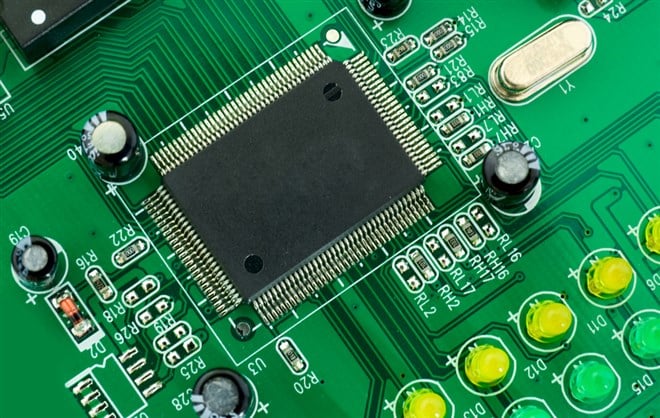
To invert a popular saying, “What should you do when chips are up?”
Some chip- and chip-gear makers are nearing buy points out of bullish areas of consolidation. Those names include NASDAQ: AMD">Advanced Micro Devices Inc. (NASDAQ: AMD), Applied Materials Inc. (NASDAQ: AMAT) and Onto Innovation Inc. (NYSE: ONTO).
Semiconductor stocks, as a whole are rallying so far in 2023, and are among the market’s best performers. The iShares Semiconductor ETF (NYSEARCA: SOXX) is up 19.79% since the start of the year. The most heavily weighted components, and their 2023 gains, are:
- Advanced Micro Devices: 35.02%
In a March 6 research note, Bank of America lowered its sales forecast for the total semiconductor industry, now expecting 3.3% year-over-year growth, down from its prior estimate of 3.5% growth.
However, it raised forecasts for certain segments. It now expects core sales, without memory chips, to increase 10.5%, up from a previous forecast for 10.1% growth.
When it comes to the wafer fabrication industry, Bank of America now sees total sales growth of 9%, significantly up from its previous view of 5% growth.
There’s actually no shortage right now of individual chip and chip-gear names with strong recent gains, combined with robust revenue and earnings growth. As with many industries, some of the big names with sound fundamentals are forming consolidations. For example, ASML Holding N.V. (NASDAQ: ASML) is trading below recent resistance above $698.59, but was holding 10% above its 200-day moving average on March 15, as the market sold off.
Here is a look at three semiconductor stocks that are nearing potential buy points:
Advanced Micro Devices
AMD designs chips for a range of computing applications, including graphics processing units for game consoles and personal computers. It also designs chips used in central processing units and in servers. Its advantage is being a large supplier of CPUs compatible with Intel Corp. (NASDAQ: INTC) x86 systems.
On AMD’s chart, you can see a consolidation that began in mid-February. The stock has been forming a shallow base, with a total correction of 15%. The pullback began after the company’s most recent earnings report.
A shallow selloff after earnings isn’t a bad thing and suggests that big investors are essentially in a holding pattern, taking a few profits, rather than selling off out of fear. Watch for the stock to clear resistance at $89, which could offer a new buy opportunity.
Applied Materials
Applied Materials provides manufacturing equipment, services, and software to the semiconductor and display industries, along with other industries. The stock has been a solid performer recently, advancing at the following rates:
- 1 month: 3.83%
- 3 months: 6.85%
- Year-to-date: 25.04%
This stock, too, has been forming a flat base. You can see that sideways area of consolidation on its chart. The current buy point is $125.
MarketBeat analyst data show a “moderate buy” rating for Applied Materials, with a price target of $129.16, an upside of 11.11%. Institutional ownership data show buyers far outnumber sellers, with 1,209 institutions accounting for $10.31 billion in inflows in the past 12 months, versus 946 institutional sellers accounting for $7.45 billion in outflows.
Onto Innovation
Massachusetts-based mid-cap Onto Innovation isn’t as well known as some of the big S&P 500 chip companies. Onto specializes in inspection, lithography, measurement, and manufacturing software solutions for semiconductor manufacturers.
The stock is forming a similar area of consolidation as Applied Materials and AMD, in that its correction is shallow, and began taking shape in early February, as you can see on its chart. The current buy point is above $88.49.
On March 15, shares were trading at $84.27, 1% above their 50-day moving average. Analysts have a “buy” rating on the stock, with a price target of $96.00, a potential upside of 13.97%. Wall Street is eyeing an earnings decline this year, but growth of 22% in 2024.







